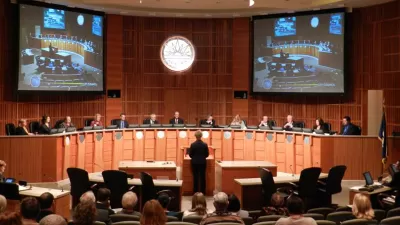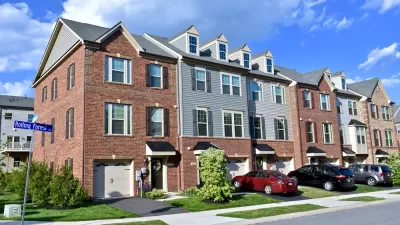The unchecked power of individual city councilmembers has, in some cases, restricted housing development and fueled corruption.

Decisions about development and upzoning have, historically, been the domain of local leaders and city councilmembers. Now, reports Henry Grabar for Slate, it appears that the tide of support for hyper-local decision making has started to turn. The effect of the longstanding policy of "member deference," writes Grabar, "has been to restrict the creation of new housing, foster corruption, and entrench boundaries of race and class."
"Theoretically, members of big-city governing bodies only have a say over big changes such as neighborhood upzonings—that is, when builders are allowed to construct taller, denser structures than before. In reality, however, thanks to outdated zoning codes and other city-run approvals, each local representative exerts a great degree of power over even minute changes to the cityscape." For cities, the system makes sense, Grabar says. "It’s hard for cities to raise money to address their many social problems, and it’s complicated to duke it out at city meetings for a share of the pie. Pay-to-play policies for new construction can directly funnel millions of dollars into new local assets such as community centers, if that’s what a council member or an alderman wants." But by allowing this level of control at the neighborhood scale, Grabar argues, "cities have internally recreated the fragmented, selfish governance pattern that characterizes their suburbs."
As "advocates have mostly given up on swaying city politicians," zoning reform has moved to the state level. In California, a state policy gives "blanket permission for accessory dwelling units" in a move that "overruled hundreds of city prohibitions, and paved the way for an explosion in small-scale infill housing in cities like Los Angeles." Oregon famously preempted local single-family zoning restrictions, and other states could pass similar laws limiting local control over zoning decisions in an effort to increase housing affordability.
FULL STORY: City Councils Are Villains of the Housing Crisis

Planetizen Federal Action Tracker
A weekly monitor of how Trump’s orders and actions are impacting planners and planning in America.

Map: Where Senate Republicans Want to Sell Your Public Lands
For public land advocates, the Senate Republicans’ proposal to sell millions of acres of public land in the West is “the biggest fight of their careers.”

Restaurant Patios Were a Pandemic Win — Why Were They so Hard to Keep?
Social distancing requirements and changes in travel patterns prompted cities to pilot new uses for street and sidewalk space. Then it got complicated.

DC Area County Eliminates Bus Fares
Montgomery County joins a growing trend of making transit free.

Platform Pilsner: Vancouver Transit Agency Releases... a Beer?
TransLink will receive a portion of every sale of the four-pack.

Toronto Weighs Cheaper Transit, Parking Hikes for Major Events
Special event rates would take effect during large festivals, sports games and concerts to ‘discourage driving, manage congestion and free up space for transit.”
Urban Design for Planners 1: Software Tools
This six-course series explores essential urban design concepts using open source software and equips planners with the tools they need to participate fully in the urban design process.
Planning for Universal Design
Learn the tools for implementing Universal Design in planning regulations.
Heyer Gruel & Associates PA
JM Goldson LLC
Custer County Colorado
City of Camden Redevelopment Agency
City of Astoria
Transportation Research & Education Center (TREC) at Portland State University
Camden Redevelopment Agency
City of Claremont
Municipality of Princeton (NJ)





























